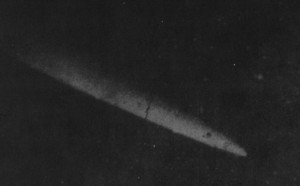FINLAY, William HenryProfessional Astronomer |
|
|
|
|
| Famous for: Discovered the great comet of 1882. . Summary: Finlay was Chief assistant at theCape Observatory 1873 – 1897 (Chief assistant to Stone 1873 – 1879; Gill 1879 – 1897) |
|
|
|
|
| History: Finlay was born at Liverpool on 17 June 1849. He graduated as 33rd Wrangler. [Warner – Astronomers, p.75.] (‘Wrangler is the name given in the University of Cambridge to those who have attained the first class in the public mathematical honours examination. The word itself is derived from the public disputations in which candidates for degrees were, in former times, required to exhibit their powers.’ [Moore, p.44.]) Finlay was not an astronomer by training, but on his skills as mathematician he was appointed as Assistant Director to Stone at the Cape Observatory. He arrived at the Cape on 21 June 1873. [Warner – Astronomers, p.75.] Due to no fault of Finlay, his appointment at the Cape Observatory was very unpopular as the previous director, Thomas Maclear, who was extremely popular amongst Capetonians, wanted his son Finlay was born at Liverpool on 17 June 1849. He graduated as 33rd Wrangler. [Warner – Astronomers, p.75.] (‘Wrangler is the name given in the University of Cambridge to those who have attained the first class in the public mathematical honours examination. The word itself is derived from the public disputations in which candidates for degrees were, in former times, required to exhibit their powers.’ [Moore, p.44.]) Finlay was not an astronomer by training, but on his skills as mathematician he was appointed as Assistant Director to Stone at the Cape Observatory. He arrived at the Cape on 21 June 1873. [Warner – Astronomers, p.75.] Due to no fault of Finlay, his appointment at the Cape Observatory was very unpopular as the previous director, Thomas Maclear, who was extremely popular amongst Capetonians, wanted his son George Maclear appointed to the position. Although he was a mathematician and inexperienced in astronomy, he rapidly assimilated the methods of reduction and technique of observing. He was tasked with taking over the work of preparing Maclear’s backlog of observations for the press. (Thomas Maclear was a prominent astronomer and tasked with a catalogue of Southern Hemisphere stars. Nearly 40 years later he retired without publishing the catalogue. He made an impressive amount of observations but never reduced the information so that it can be published.) [Warner- Astronomers, p.75.] During the remainder of Stone’s tenure at the Cape, Finlay and George Maclear were almost entirely responsible for the working of the transit circle. (Stone was a sickly person and did not like to work at night.) [Warner – Astronomers, p.75.] In May 1879 the catalogue was completed and the director of the Cape Observatory, Stone sailed for England to take up the post of Radcliffe Observer. The new director was David Gill, a very dynamic person who would take make the Observatory a world class institution. [Warner – Astronomers, p.79.] On 8 September 1882 Finlay, after a nights work, was on his way home when he observed a comet. He went back to the Cape observatory and took precise positional measurements with the 6-inch Grubb telescope. This was to become known as the “Great comet of 1882”. (C/1882R1) [Koorts – British, p. 47] David Gill later took a photograph of this comet, one of the first photographs ever of an astronomical object. During the 1882 Transit of Venus Finlay with R.T. Pett as assistant manned the Aberdeen road station as part of the British transit expeditions. [Koorts – British, p. 47] . Career: 1873 – 1897: Chief assistant at theCape Observatory . Personal: 1849 June 17: Born at Liverpool, U.K. Died |
|
|
|
|
|
Link to the Telescope Manufacturers. |
|
|
|
|
|
Link to the Main Bibliography Section and more information about Sources. |
|
| Remaining Artifacts:
Bibliography: By Finlay: Note: Uncertainty in Source Material as to the spelling of his surname. Is it Finley or Finlay? Brian Warner’s works are the most authoritative sources with the greatest use of primary sources. He uses Finlay. |
|
|
|
|
| Related External Links: Obituary Notes: |
|
Gallery
 The Great Comet of 1882 discovered by Finlay. This photo also helped to initiate astro-photography (see Gill)
The Great Comet of 1882 discovered by Finlay. This photo also helped to initiate astro-photography (see Gill)
